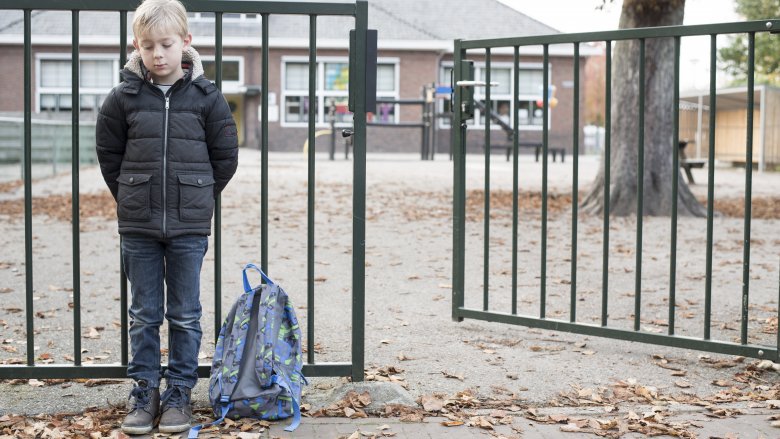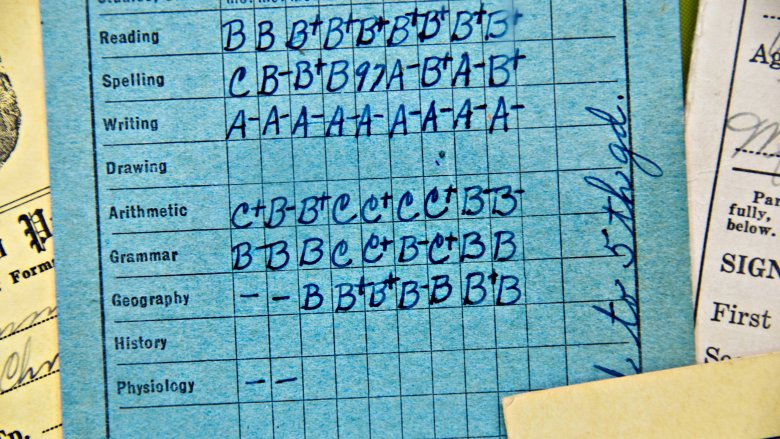Signs Your Child Is Gifted
How do you know if your child is gifted or just a very high achiever? I interviewed Dr. Wendy Hirsch Weiner, founder and principal of Conservatory Prep Schools, a middle and high school in Davie, Florida for gifted students, about her experiences working with gifted children. Dr. Weiner has been the principal of Conservatory Prep Schools since 2005 and previously worked with families of children who are twice-exceptional, which means they're gifted and have learning disabilities.
Dr. Weiner defines gifted as "an innate cognitive ability in at least one area, which is well beyond the capacity of their peers and are in need of additional accommodations to be able to meet their potential." Her insights on gifted children come from her decades working with them, observing them in the classroom, and creating curriculum to meet their needs. Here's how to know if your child is gifted.
They're good problem solvers
One of the first signs your child is gifted is they're really good at solving complex problems. Dr. Weiner told me, "People feel if a kid can spit out a lot of worksheets, then they're gifted. However, just because somebody can do it quickly and they have the speed or the processing, does make them a gifted child. One of the differences is that they have that strong abstract part of them which can problem solve."
She added, "These are kids that can go into a situation and they can hear different concepts, different ideas, see different things, and make all those connections. That's really where the gifted part comes in."
There are some drawbacks to problem solving, especially if it's not directed at the right problem. Dr. Weiner went on, "Unfortunately, if their problem solving skills aren't identified when they're younger, it can get them into a lot of trouble. All of a sudden the kids will say, 'Oh, I can make a lot of money being a drug dealer. This is the way I can go about doing it.' So we have to direct them, if they are gifted, to get them the services they need."
They're sensitive
If you notice that your kid is very sensitive — they don't like loud noises or crowds, and they need a lot of time alone — that could be a sign that they're gifted. Dr. Weiner explained, "I think that the percentage is much higher that these kids are highly sensitive than the rest of the population. They don't necessarily have that sensitivity trait, but many of them do. And for many of them, the sensory issues are magnified."
She added, "In a lot of cases, the child can appear to be withdrawn or extremely shy. They can take a while to respond to questions because they want to get the right answer. I think they need a lot more down time." She told me that gifted kids "get overstimulated much more easily than other kids. I've seen kids who will just sit under a table if kids are running around or there's too much noise. They are on sensory overload a lot."
Unfortunately, instead of giving these kids what they need, Dr. Weiner continued, "A lot of times they will be taken to the psychologist and be told they need more social skills; they need to be more outgoing. They don't want to be more outgoing. They need their time away."
They have difficulty making friends
If your child is struggling to make friends, it may due to giftedness. Their sensitivity makes it harder for gifted kids to make friends. And sadly, there are other traits that also make it hard for them to fit in. Dr. Weiner said, "They want friends, they really do. But they don't know how to go about it. And even with a road map, it doesn't make any sense to them. They are never going to fit in that mold."
When their humor doesn't match that of their peers, they can feel awkward or confused in social situations, as well. Dr. Weiner explained, "When it comes to humor, I find that they have a dry, sophisticated humor, and the other kids don't really understand that at all. If the other kids are joking around, let's say they're 10, 11, 12 years old, typical humor for that age group, they don't particularly find that funny."
Dr. Weiner added that sometimes their peers just don't "get" them. "Socially, other people do look at them as if they have two heads. And I think when they start talking, some other kids become intimidated. The best thing for them to do it to find after school activities that interest them, and to find clubs, and then everybody in that club has the same interest."
They aren't good at small talk
Does your kid skip the small talk and go right to talking about deeper, more complex topics? That could be a sign of giftedness.
Dr. Weiner told me, "Small talk for them is very hard. For a lot of these gifted kids, to go to a party, and everyone is meeting people for the first time and making small talk, they seem to hate that. They don't want to be talking about what they're going to be wearing the next day. They might want to talk about politics or dinosaurs or something they feel is more cerebral."
They complain of boredom
If your kid complains of being bored in school, pay attention. They may be saying it to cover up other frustrations that gifted kids have. Dr. Weiner told me, "They say they're bored, but something else is usually going on. Sometimes they're bored because they have already learned the material. Sometimes they are missing some gaps in their learning, but that's boring to them, so they don't want to go back."
However, she added, "Sometimes, it's easier for the child to say that they're bored. If the parent is saying, 'He doesn't like it because he's bored,' the kid would rather say, 'Yes, that's why I'm doing it.' It's easier than to find out exactly what's going on."
"Gifted kids don't really get that bored, they usually find endless ways to entertain themselves."
They're highly creative
You may think of creativity as being good at artistic activities, but for gifted kids it's about seeking out multiple answers to problems. If your kid is always coming up with new ideas and seems to find a million answers to every problem, you might have a gifted kid on your hands.
Dr. Weiner explained, "They are very creative. They love being an entrepreneur and constantly coming up with new ideas. They find a multitude of ways to answer a problem. A non-gifted kid might say, 'I found one answer, and I'm fine with that.' These kids will never find one answer. They will put a multitude of things together."
They're not motivated by grades
While gifted kids tend to come up with a lot of different solutions to problems, they may not always get the best grades in their class. So if you think your child might be gifted, but they're struggling in school, trust your intuition.
Dr. Weiner told me, "They don't exactly care so much about getting the gold star or the end result. A lot of them really care about the process. And as soon as they get bored with the process, you can't say, 'Work a little bit harder, because you need to get an A.' They don't necessarily care about the A. So finding out what motivates them, it can't necessarily be the grade."
I asked Dr. Weiner what does motivate gifted kids, and she shared, "They are motivated more by interests that pertain to them, things that excite them. They want to explore. They want to discover new knowledge." She added, "They want to figure out how they can put things together from different concepts and different ideas. They want to learn about things that are going on in the world today, and take all of that information and research to come up with new ideas."
They want to delve deeply into issues that are important to them
Because gifted kids are motivated by exploring different ideas, they tend to explore issues in a much deeper way than other kids. If your kid tends to become obsessed with topics, they very well may be gifted.
Dr. Weiner illustrated with an example. "We had an AP History class in which they were talking about Van Gogh. And in an AP class, they have to go very, very fast. And the kids said, 'Wait, wait, wait! I want to know with Van Gogh, when he cut off his ear, can we compare his artwork before and after? Did he go crazy? What were the ramifications?'"
She added, "That goes on a lot. They have a lot of unanswered questions a lot of the time. But with other kids who aren't gifted, they can come up with the information, find out a little about Van Gogh, and then say, 'Okay, I can check that off the list. I know about Van Gogh.' With my gifted kids, that just doesn't fly at all."
They have tremendous fears
Unfortunately, because gifted kids can imagine so many different scenarios, they often struggle with fear, anxiety, and depression due to imagining the worst. "For example," explained Dr. Weiner, "if I told a child, 'Look left and look right before crossing the street, and if you don't see any cars, cross the street,' these kids will look right and left, and they'll say, 'I think a car may come out of the driveway or down the street.' They can come up with all these scenarios, and say, 'I think I'm going to stay inside.'"
She added, "That's something parents need to be aware of. Some of these fears, some of these scenarios they can create in their mind, might be more extreme than what they see with other kids. I would get them tested for gifted before leading them on the path of [prescription] drugs."
Dr. Weiner continued, "This population has a much higher incidence of anxiety and depression, all stemming from the same thing. A lot of times, they can imagine things, and their imaginations can get the best of them."
They care about the big picture more than concrete facts
Do you find that your kid has trouble remembering specifics but is really good at seeing the big picture? Gifted kids are great at understanding big, abstract concepts, but concrete facts aren't as important to them.
Dr. Weiner explained, "They always come up with the broad concept before the facts. I was observing a kid once who was six years old, and the teacher was reading The Lion King. Afterwards, the teacher asked, 'What was the name of the lion? What was the name of the pride?' The kid didn't answer. Anything with factual information, the child did not answer." She continued, "Finally, the teacher asked, 'What was this about?' That's when the kid raised her hand and said, 'It's about taking responsibility for your community.' The kid was six."
Dr. Weiner added, "Their abstract reasoning is much stronger than their concrete reasoning, their lower order skills. They do see the big picture first. But," she warned, "that's also why when you have a gifted kid who is failing school or getting Cs and Ds in middle or high school, it's because they need the big picture first, and then they can go backwards. But if they don't understand the big picture first, they can't move forward. That's why so many gifted kids have a hard time in a traditional school."
They misinterpret instructions
In addition to missing specific concepts, gifted kids also may have trouble following instructions — a trait that will drive you and their teachers crazy.
Dr. Weiner told me, "There are a lot of kids who have no idea what the instructions are. They misinterpret everything. So sometimes if the teacher is not really clear about what the instructions are... it might be clear in their mind, but not to a gifted child, who can see endless possibilities for 'Go to the other end of the classroom and put your paper away,' they will end up doing nothing."
She explained, "Many times, they feel that they're going to be humiliated because everyone else seems to understand the direction but that child. And if the child doesn't understand the directions, then they feel, 'I'm supposed to be really smart, and I can't figure out where to put my paper away,' they're going to sit there and just throw it on the floor."











